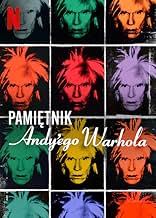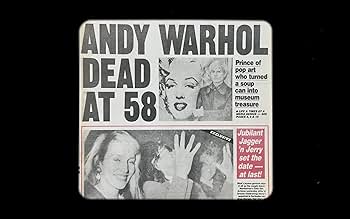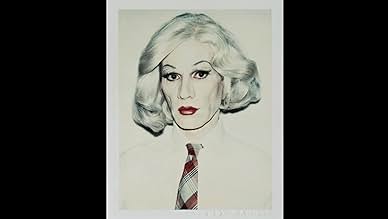NOTE IMDb
7,6/10
2,9 k
MA NOTE
Après avoir survécu à une tentative d'assassinat en 1968, Andy Warhol documente sa vie et ses sentiments. Cette série révèle les secrets de ses journaux intimes.Après avoir survécu à une tentative d'assassinat en 1968, Andy Warhol documente sa vie et ses sentiments. Cette série révèle les secrets de ses journaux intimes.Après avoir survécu à une tentative d'assassinat en 1968, Andy Warhol documente sa vie et ses sentiments. Cette série révèle les secrets de ses journaux intimes.
- Nommé pour 4 Primetime Emmys
- 2 victoires et 9 nominations au total
Parcourir les épisodes
Avis à la une
Didn't particularly like the first few episodes, but I enjoyed the last few ones, so hang in there. This is a wonderful, insightful, profound and entertaining biopic. Plus the majority of his friends, friends, are alive to provide insight and interpretations to his diary entries, wonderfully narrated.
Amazing how prophetic and influential his work and life are to our current era. He was the original "selfie, marketeer, and social influencer." He took fotos and video of all his events, work, social and intimate activities. In fact, it is commented what craziness he would have creative had lived he in the current social media age.
Amazing how prophetic and influential his work and life are to our current era. He was the original "selfie, marketeer, and social influencer." He took fotos and video of all his events, work, social and intimate activities. In fact, it is commented what craziness he would have creative had lived he in the current social media age.
A class act on all fronts.
First of all, from the credits on in, it looks sumptuous. The use of digital technology is far more aesthetically sophisticated than pretty much anything I'm seeing from Hollywood and shows, like only one or two other films I'm aware of (the neo Giallo 'Amer' is one) that digital at its best can make a vital, valuable contribution to movie imagery. We even get a sort of implicit origin story for all this in a couple of clips of Warhol trying early computer drawing programmes, once with instruction from Steve Jobs. The leap from that to this doc is something like that from kid's drawing to the high Renaissance. Here, the tech is used to seamlessly weave together an extraordinarily rich array of filmed source material available on Warhol with modern-day interviews and give the whole a lushness at least equal to that of film.
The digital finishing touch: with the permission of the Andy Warhol Foundation, Warhol's voice has been computer simulated to read the diaries - and just as the computerised imagery achieves warmth, the voice, the seeming summa of Warhol's stated desire to become a machine, has a surprisingly human quality, its hint of melancholy entirely right for the diaries.
This little irony of Warhol finally becoming a machine but the machine achieving feeling is almost a metaphor for the story being told here, for the likely discovery of what being a machine meant to Warhol as a man. In an almost aggressively gleeful flouting of Barthes' 'Death of the Author,' the doc is primarily about Warhol's personal life, especially his long-term love relationships with men. Excellent as Barthes' argument is in many ways, we might note at this point that he was himself a gay man in a homophobic time, who may have had his own reasons for wanting to keep the author's biography in the shadows.
This is the question being asked here: how much was Warhol's brilliantly constructed artistic persona - machinelike, detached, asexual - born of a need to hide or at least make palatable his homosexuality? As discussed here, this is not a reductive question. It more than allows for the fact that, as all art is artifice, the need to veil certain messages can actually enrich the work, and also for Warhol's work still to be read through other lenses. Nevertheless, given the way the persona played itself out in the work, I think the series makes an incredibly strong argument that this is a question, and an area of his biography, that Warhol scholarship cannot ignore, that the personal likely mattered to the work even in terms of the way it was hidden by the work.
Fortunately, for the filmmakers and the viewers, it also, by its nature, makes for a fascinating, touching human story.
First of all, from the credits on in, it looks sumptuous. The use of digital technology is far more aesthetically sophisticated than pretty much anything I'm seeing from Hollywood and shows, like only one or two other films I'm aware of (the neo Giallo 'Amer' is one) that digital at its best can make a vital, valuable contribution to movie imagery. We even get a sort of implicit origin story for all this in a couple of clips of Warhol trying early computer drawing programmes, once with instruction from Steve Jobs. The leap from that to this doc is something like that from kid's drawing to the high Renaissance. Here, the tech is used to seamlessly weave together an extraordinarily rich array of filmed source material available on Warhol with modern-day interviews and give the whole a lushness at least equal to that of film.
The digital finishing touch: with the permission of the Andy Warhol Foundation, Warhol's voice has been computer simulated to read the diaries - and just as the computerised imagery achieves warmth, the voice, the seeming summa of Warhol's stated desire to become a machine, has a surprisingly human quality, its hint of melancholy entirely right for the diaries.
This little irony of Warhol finally becoming a machine but the machine achieving feeling is almost a metaphor for the story being told here, for the likely discovery of what being a machine meant to Warhol as a man. In an almost aggressively gleeful flouting of Barthes' 'Death of the Author,' the doc is primarily about Warhol's personal life, especially his long-term love relationships with men. Excellent as Barthes' argument is in many ways, we might note at this point that he was himself a gay man in a homophobic time, who may have had his own reasons for wanting to keep the author's biography in the shadows.
This is the question being asked here: how much was Warhol's brilliantly constructed artistic persona - machinelike, detached, asexual - born of a need to hide or at least make palatable his homosexuality? As discussed here, this is not a reductive question. It more than allows for the fact that, as all art is artifice, the need to veil certain messages can actually enrich the work, and also for Warhol's work still to be read through other lenses. Nevertheless, given the way the persona played itself out in the work, I think the series makes an incredibly strong argument that this is a question, and an area of his biography, that Warhol scholarship cannot ignore, that the personal likely mattered to the work even in terms of the way it was hidden by the work.
Fortunately, for the filmmakers and the viewers, it also, by its nature, makes for a fascinating, touching human story.
I had no idea about Warhol's life except for his pop and Campbell's art. This documentary shows the human side of the artist. His weakness, fears, insecurities for which his only outlet would've been his art. Like most people in the industry, his brilliance had a price to pay. I respect his art, even though I am not a fan I watched this with an open mind and learned so much more.
This was a binge watch for me as the 70's & 80's was my time in NYC living in an illegal loft before Soho became the in place for the BBQ crowd, I don't mean barbeque. I knew most of the people that hung out with Warhol and Basquiat and met both of them many times during the disco, drugs, drinks era. I spent most of my salary each month buying art from both of them when Basquiat was selling signed drawings on postcards for $25 and Warhol who couldn't give away his Campbell soup can paintings away at the The Odeon, which is celebrating their 42nd anniversary this year. Yes I had great insight at that time of what would be one day and now smile every time I see the prices that both of these artists command at auction. The documentary by Ryan Murphy focuses more on Warhol's lonely life as a closeted gay man looking for love and his obsession with beautiful Waspy men and death. The interviews with his inner circle that are still alive was insightful but as my title says no one will ever know the real Andy Warhol.
A wonderful peep behind the curtain of a genius self centered manipulator. His self marketing has never been repeated. Unser the wig was a brilliant mind. All can learn from these diaries. Was Warhol a good human being ? No.
Le saviez-vous
- AnecdotesA voice cloning technology called "Resemble AI" was used to recreate Andy Warhol's voice. Director Andrew Rossi explained that it stemmed from Warhol's desire to be emotionless like a machine.
Meilleurs choix
Connectez-vous pour évaluer et suivre la liste de favoris afin de recevoir des recommandations personnalisées
- How many seasons does The Andy Warhol Diaries have?Alimenté par Alexa
Détails
- Date de sortie
- Pays d’origine
- Sites officiels
- Langue
- Aussi connu sous le nom de
- The Andy Warhol Diaries
- Voir plus de crédits d'entreprise sur IMDbPro
- Durée1 heure
- Mixage
- Rapport de forme
- 16:9 HD
Contribuer à cette page
Suggérer une modification ou ajouter du contenu manquant





































